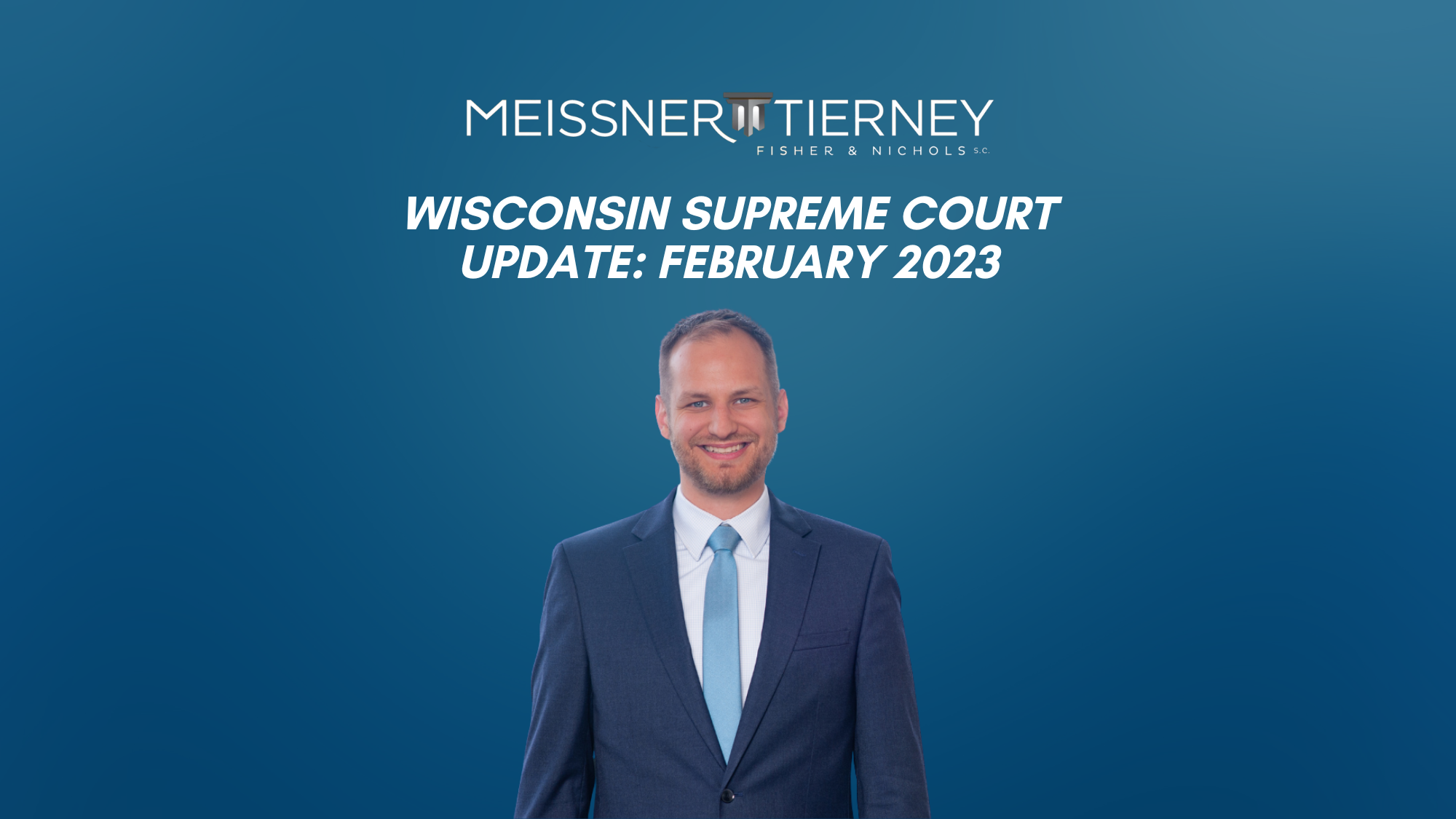Caleb R. Gerbitz
The court handed down a few decisions in civil cases this past month. We take a look at those decisions and check in on the court’s February oral argument calendar in this month’s update on the Wisconsin Supreme Court’s docket.
Cases Decided
Slabey v. Dunn County, No. 2020AP877
Civil Rights
Decision Filed: January 18, 2023
Public Citation: 2023 WI 2
This § 1983 case involves a claim brought by a plaintiff who was sexually assaulted by a correctional officer while she was incarcerated in a county jail. The question was not whether the sexual assault occurred—everyone agreed that it did—but whether the county failed to properly train, monitor, supervise, and discipline the correctional officer who had a history of flirting and fraternizing with inmates. In a 5-2 decision authored by Chief Justice Ziegler, the court affirmed summary judgment for the county, holding that no reasonable fact finder could find that the county had failed to sufficiently oversee its correctional officer such that the county could be said to have caused the assault under the causal standard articulated in Monell v. Department of Social Services, 436 U.S. 658 (1978). Justice Karofsky authored a dissent, joined by Justice Ann Walsh Bradley. In her view, a reasonable factfinder could find that the county caused the assault based on evidence that the county ignored clear warning signs and created circumstances that allowed the correctional officer to sexually assault an inmate.
Wisconsin Manufacturers and Commerce v. Evers, Nos. 2020AP2081-AC & 2020AP2103-AC
Open Records
Decision Filed: January 23, 2023
Public Citation: 2023 WI 5
Last term, the court issued a decision in this case, holding that WMC could not obtain pre-release judicial review of the governor’s decision to produce records in response to an open records request. The supreme court this month denied WMC’s motion for reconsideration in a published order that did not draw a dissent. What’s interesting about the order is its clarification that a footnote from the affirmed court of appeals’ decision no longer has any precedential value. The court has previously held that unless it explicitly states otherwise, a court of appeals opinion loses precedential value when the supreme court overrules it. But what about when the supreme court affirms without addressing an issue touched on by the court of appeals? Does an affirmed court of appeals’ opinion remain precedential on that unaddressed point? Current precedent doesn’t appear to say one way or the other, and the court saved this question for another day.
Dostal v. Strand, No. 2020AP1943
Insurance
Decision Filed: January 26, 2023
Public Citation: 2023 WI 6
Can second-degree reckless homicide qualify as an “accident” under a homeowner’s insurance policy? Yes, answered the supreme court in a 4-3 decision. In 2017, infant Haeven Dostal died due to head trauma inflicted by her father, Curtis Strand—a crime for which Strand was convicted of second-degree reckless homicide. Haeven’s mother sued Strand and his home insurer, alleging negligence and wrongful death against Strand. Relevant to this case, the insurer disputed coverage based on its view that there was no covered “occurrence” (defined as an “accident”) because Haeven’s death was not accidental—it was a homicide. The court treated this argument as asking whether issue preclusion, based on Strand’s criminal conviction, prevented the mother from litigating whether Haeven’s death was an accident. In an opinion by Justice Ann Walsh Bradley, the court held it did not. It concluded that a jury could find that the conduct that produced Strand’s conviction for second-degree reckless homicide nevertheless was accidental, such that it was a covered occurrence under the policy. Chief Justice Ziegler penned a vigorous dissent, joined by Justices Roggensack and Rebecca Grassl Bradley. In the dissent’s view, Strand’s conviction was enough to foreclose any argument that Haeven’s death was an accident.
Up for Review
Greenwald Family Limited Partnership v. Village of Mukwonago, No. 2021AP69-FT
Taxation
Oral Argument: February 20
Wisconsin Stat. § 66.0703(12)(a) provides that a party wishing to obtain judicial review of a special assessment “shall serve a written notice of appeal upon the clerk of the city, town or village.” But in this case, the property owner served its notice of appeal on the village attorney with the expressed understanding that doing so was sufficient to accomplish service on the village clerk. In a summary disposition, the court of appeals held that § 66.0703(12)(a) requires service on the village clerk directly and that service may not be accomplished through the village attorney. The supreme court granted review to address this narrow issue.
Fleming v. Amateur Athletic Union of the United States, No. 2021AP1054
Employment
Oral Argument: February 23
Typically, the statute of limitations for a negligent hiring and supervision claim is three years, according to Wis. Stat. § 893.54(1m)(a). However, an exception under Wis. Stat. § 893.587 extends the limitations period for any “action to recover damages for injury caused by an act that would constitute a violation of” any of several statutes criminalizing sexual assault of a child. For those actions, the limitations period is extended until the victim turns 35. In this case, Femala Fleming, now an adult, asserts a negligent hiring and supervision claim against the AAU for the repeated sexual assaults her AAU basketball coach committed against her when she was between the ages of 13 and 16. According to Fleming, § 893.587’s extended limitations period applies to Fleming’s negligent hiring and supervision claim because her injuries were “caused by an act” that violated several child sexual assault statutes. The court of appeals agreed with Fleming and held that it was irrelevant that Fleming’s theory of liability also required that her injuries be caused by AAU’s negligent conduct. On appeal, AAU argues that Fleming’s claim is time-barred because—with one exception for sexual assault by a clergy member—§ 893.587 extends the liability period only for claims against those who committed sexual assault of a child and not to claims against employers.
New to the Docket
Sanders v. Wisconsin Claims Board, No. 2021AP373
Compensation for Wrongful Conviction
Petition for Review Granted: January 18, 2023
Under Wis. Stat. § 772.05, an innocent individual wrongfully convicted of a crime may recover up to $25,000 from the state. The court granted review in this case to consider whether the Wisconsin Claims Board erred by awarding $25,000 to a man who served 26 years for a crime he did not commit without explicitly addressing his request for additional compensation above and beyond $25,000.





